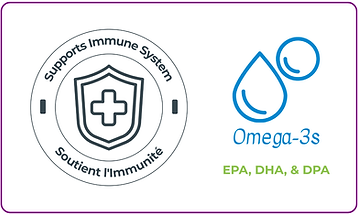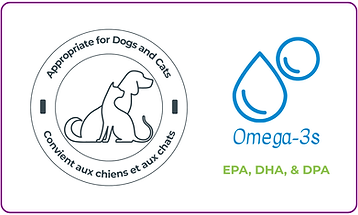
Seal Omegas
Generated using AI.
Whole-Body Wellness for
Cats & Dogs
A Distinct Source of Marine Omega-3s for Pets
Seal oil is naturally rich in EPA, DHA, and DPA — three long-chain omega-3 fatty acids found in marine sources and commonly included in pet nutrition.
Together, these fatty acids play complementary roles in supporting normal function across many of the body’s systems, including joints, skin and coat, brain, heart, and overall vitality.
Unlike most fish oils, which primarily provide EPA and DHA, seal oil is one of the few natural sources that also contains DPA. DPA is structurally distinct and is recognized in scientific literature for its role within the broader omega-3 pathway.
By providing a full spectrum of marine omega-3 fatty acids, seal oil offers a more complete omega profile — making it a thoughtful option for pet parents looking to support long-term wellness through simple, natural supplementation.
Below, you’ll find an overview of how these omega-3 fatty acids are associated with different body systems, drawing on established research and nature-derived nutrition.
EPA (eicosapentaenoic acid), DHA (docosahexaenoic acid), and DPA (docosapentaenoic acid) are long-chain omega-3 polyunsaturated fatty acids (PUFAs).

Seal vs. Fish Oil:
What Makes It So Special?
Naturally Contains DPA
Seal oil naturally contains docosapentaenoic acid (DPA), a long-chain omega-3 that is typically absent or present only in trace amounts in most fish oils. DPA is recognized in scientific literature as part of the broader omega-3 pathway, complementing EPA and DHA.
A Mammalian Source of Omega-3s
As a mammalian oil, seal oil more closely resembles the fatty acid structure found in cats and dogs. This similarity may allow pets to utilize its omega-3s efficiently, often with smaller serving sizes compared to traditional fish oils.
A More Complete Omega-3 Profile
With a naturally occurring balance of EPA, DHA, and DPA, seal oil offers a full-spectrum marine omega-3 profile. This makes it a thoughtful alternative for pet parents looking to support overall wellness — including joints, skin and coat, brain, and vitality — through simple, nature-derived nutrition.
Whole Body Benefits
Seal oil is naturally rich in the long-chain omega-3s EPA, DHA, and DPA (DPA is typically higher than in most fish oils). These fatty acids are precursors to specialized pro-resolving mediators (SPMs)—resolvins, protectins, and maresins—that actively resolve inflammation rather than simply suppress it.
Joints & Mobility
Use of marine omega-3 enrichment, such as adding seal oil supplements to food, showed a marked improvement in weight-bearing and osteoarthritis (OA) scores, in a randomized, blinded trial.
Mechanism of action: Ingestion along with absorption of EPA, DHA, and DPA, causes a shift in the eicosanoid balance within the body, causing SPMs to be generated. These Specialized Pro-resolving Mediators result in less joint inflammation, leading to improved weight-bearing and lameness scores.

Brain & Vision
Omega-3 fatty acids, specifically DHA, is recommended during growth to help support better learning, and better vision through improved visual acuity and cognitive function.
Mechanism of action: DHA is known to be a structural fatty acid in both the retina and brain.
.png)
Digestive Support
The same SPMs that help support a healthy immune system, not only resolve inflammation in joints, for example, but also in the intestines. Helping those pets with a sensitive gut to achieve comfort.
Mechanism of action: the SPMs formed from DPA/DHA help to resolve inflammation in the intestines, and support mucosal healing.
.png)
Skin & Coat / Allergic Itch
Addition of marine omega-3 fatty acids, for example as found in seal oil, has shown improvements in skin and coat condition. There are also reports of reduced pruritus and lesions in dogs with atopic dermatitis when added to standard therapies for this condition.
Mechanism of action: Ingestion/absorption of the omega-3 fatty acids found in seal oil supports the lipid composition of the epidermal layer of the skin.
.png)
Heart & Healthy Blood Lipids
Elevated triglyceride levels were found to be lowered in hyperlipidemic dogs that ingested omega-3 fatty acids. More specifically, at least in people, DPA/EPA were found to reduce activation markers.
Mechanism of action: EPA, DHA, and DPA, when combined, act to lower triglyceride levels, modulate platelet activity, and DPA specifically may contribute to anti-thrombotic signaling.
.png)
Immune System & Inflammation
DPA, which again is the fatty acid specifically found in marine omega-3's, such as seal oil, is a precursor to several potent SPMs (specialized pro-resolving mediators) that have been shown to resolve inflammation and support a healthy immune system.
Mechanism of action: DPA converts readily to SPMs that act to resolve inflammation and promote tissue homeostasis.
.png)
.png)
Check Out Our Other Seal-based Products for Added Protein & Omega-3s
Selected Scientific Citations Composition & DPA Shahidi F. Marine Mammal Oils: seal blubber long-chain omega-3 profile including DPA. Byelashov OA, et al. Nutrients 2015: most fish oils contain
.png)

